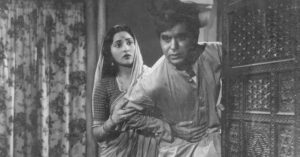In the history of Indian cinema Sarat Chandra Chatterjee’s despairing tale of ill-fated romance, Devdas, written in 1917, has been the only literary text that has been produced 11 times in six languages by filmmakers as diverse as Naresh Maitra and Anurag Kashyap. But the overall popularity of Bimal Roy’s cinematic version, across the ages, stands out amongst the lot. And one of the primary reasons for its immortality is the titular role played by the late thespian Dilip Kumar. His emotional portrayal of an anguished lover who is unable to accept his plight as an unrequited lover garnered him a distinctive position amongst cine-goers.
Together with other releases that dealt with similar themes of love, loss, and despair such as Mela (1948), Andaz (1949) Babul (1950), Jogan (1950), and to a certain extent, Deedar (1951) and Shikast (1953), amongst others, catapulted Dilip Kumar’s fame as the ‘King of Tragedy,’ a title which till date hasn’t found any faithful successor in the Indian film industry.
Born as Mohammad Yusuf Khan on December 11, 1922, in Peshawar (then in undivided India, now in Pakistan), Dilip Kumar, was one of the twelve children in the Pathan family. His father would later move to Bombay, now Mumbai, in Maharashtra and earn his livelihood as a fruit merchant. Dilip Kumar would begin his income as a young boy doing odd jobs. But as fate would have it, he would go on to build a career in films by debuting as a hero in Jwar Bhata (1944) made by one the most popular studios of early Indian cinema, Bombay Talkies.
The film did not fare well at the box office and the critics had rather ‘acerbic’ opinions regarding the fate of the young actor. But Bombay Talkies made two more films, Pratima (1945) and Milan (1946), with their newfound artist. It was, however, with Jugnu in 1947 that he first tasted box-office success with Jugnu (1947) and thus began a memorable journey into the world of cinema.
The next two decades, the 50s and 60s, would witness Dilip Kumar donning one role after the other and maintaining the equilibrium of each of the characters with consistency and sensitivity. Some of these roles were serious-minded and tragic while others were light-hearted in their portrayal, like Azaad (1955), Kohinoor (1960). Naya Daur (1957), Yahudi (1958), Madhumati (1958), and Paigham (1959) were also some of the important films in his oeuvre as an actor. He brought credibility to the roles with strength and conviction. The consummate ease with which he makes these characters come alive made him a stand-out performer amongst his contemporaries.
With the release of K. Asif’s magnum opus Mughal-e-Azam (1960), Dilip Kumar also basked in the glory of the film’s success, both aesthetically and commercially, portraying the role of the young rebellious Mughal prince Salim. It was during such a period of the peak in his career that he famously rejected international projects like 20th Century Fox’s The Rains Came and David Lean’s Sherif in Lawrence of Arabia (1962).
His other noteworthy films from this decade include Ganga Jamuna (1961) Leader (1964), Ram Aur Shyam (1967), and Admai (1968).
The 70s saw a decline in his career. Films like Gopi (1970), Dastan (1972), Sagina (1974), and Bairaag (1976) didn’t work their charm at the box office. But the veteran actor bounced back and regained his claim to stardom in the 80s with films like Kranti (1981), Vidhata (1982), Shakti (1982), Mashaal (1984), and Karma (1986) among others. All these films were either multi-starrer or had a strong supporting cast. Despite that, Dilip Kumar’s performances in these films were moving and had the ability to invoke empathy among audiences. The 90s will remember Dilip Kumar portraying the powerful Thakur Veer Singh confronting the equally rugged Rajeshwar Singh (Raaj Kumar) in Saudagar (1991).
Besides winning multiple Filmfare Awards and Dadasaheb Phalke Award in 1994, Dilip Kumar has also won other prestigious honors from the Government of India — Padma Bhushan in 1991 and Padma Vibhushan in 2015. He was also conferred Nishan-e-Imtiaz (1998) from the President of Pakistan in 1998, the country’s highest civilian honor.
Among the last surviving stars of the Golden Age Of Bollywood, Dilip Kumar’s demise leaves behind a void hard to fill and a legacy, that will inspire generations to come.

